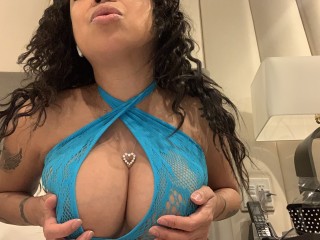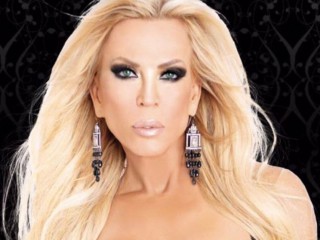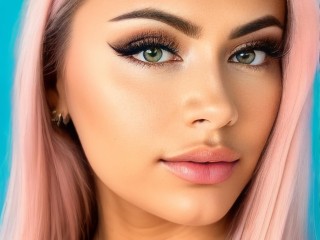
Porn Depends on Them and Women Love/Hate Them.
Porn with sound, color, storylines, pubic hair, a bra, panties, garter belt, stockings, and high heel shoes became the female dress-code standard in the early 1970s. Fast-forward to the 21st century and the bra is still a major star in the adult entertainment industry. This is ironic because every woman I know who wears a bra has at least one that she wears with confidence, but I’ve never met a bra-wearer who likes the way the damn things feel.
I know for a fact that I am not the only person with breasts to wonder why the hell anyone invented the bra. I mean, they are convenient sometimes but underwires stick in your armpits, sports bras give you uni-boob, wire-free bras don’t provide support, and strapless bras are great in theory but not long-term solutions for anyone with any real cleavage. But, damn, when you get the girls lifted and separated, they sure do look good.
The Minoans lived on the island of Crete and were innovators in many ways. It’s possible that as far back as the 14th century BCE their women bound their breasts in a bikini-like garment called an apodesmos. Ancient Greek, as well as Roman women, wore similar outfits when they exercised. They were comprised of simple bands of wool or linen wrapped across the breasts and secured at the back. All the better for leaping bulls and performing calisthenics.
Women living in ancient Egypt, India, and East Asia all had variations on this theme, although the Egyptians wore a garment that was sewn closed instead of pinned. It wasn’t until the European Middle Ages that women adopted the cloth binder to not merely restrain their breasts but to make them look smaller and less visible. This stands in stark contrast to the Renaissance, which adored cleavage. It was the dresses themselves that provided the support during this time. They pressed the breasts together, pushed them up, and introduced the idea that firm breasts with a lot of cleavage equaled rich and beautiful.
Fast-forward to the 1300s CE in France. Philip the Fair’s surgeon, Henri de Mondeville, observed that some women placed their breasts into two bags inserted into their dresses. The bags were drawn tight and fastened with a matching band. Then, during the 16th century, the Western fashion world went wild and women began to wear corsets. While these created a killer silhouette and made it impossible not to notice a fine set of boobs, corsets were a pain to get in and out of. They also did some horrible things to women’s bodies for more than 100 years. Then, once again, the French came to our rescue.
Herminie Cadolle introduced the corselet gorge (corset divided in two) at an 1889 Paris fashion exhibition. To make it a more functional garment, she added elastic and shoulder straps. In 1893, the word “brassiere” appeared in a New York newspaper. In 1904, it was used in DeBevoise Company advertising. Vogue magazine refers to the brassiere in 1907, and the term was introduced to the language of intimate undergarments in 1911 when it was added to the Oxford English Dictionary.
Alas for Cadolle’s place in history, Mary Phelps Jacob, an American socialite who wanted to be able to dance in a sheer dress without fighting her corset, was awarded a patent in 1914 for a piece of lingerie that looks suspiciously like an early version of the modern bra. Soon they were selling like crazy. Thanks to Jacob, women were able to prove their worth during World War I when it became vital for them to join the job force. Clearly, working in a corset would be impossible and due to the metal shortage, boning for corsets was in short supply.
This was far less of an issue during the 1920s because the new silhouette was slim, sleek, and youthful with a flat chest. The bandeau became all the rage, and, in some ways, women returned to their ancient bra-wearing roots.
Fashion is fickle, so by the early 1930s, the word “bra” came into use, they were manufactured on a large scale, and adjustable bands were introduced, as well as padding, eye hooks in the back, and a variety of cup sizes. Bras were no longer one-size-fits-all. Helene Pons took advantage of this and received a patent in 1931 for a bra with an “open-ended wire loop” or, as we call them today, fucking underwires.
Once World War II rolled around and women were again drawn into the public workplace, the torpedo bra made its appearance. Also known as a bullet bra, the cups were exaggerated and pointed, making their contents impossible to ignore, especially when worn under a tight sweater. Some insisted that they also provided protection to women on the assembly line. While this seems optimistic, the truth is that bras were getting sexier.
Potentially interesting bra factoid: Howard Hughes was a famous billionaire, pilot, film director, philanthropist, collector of his own fingernail clippings, and a man obsessed with actress-friend Jane Russell’s breasts. Unhappy with how those copious breasts looked in his 1943 movie, The Outlaw, he used his engineering skills and designed a cantilevered bra to better display her decalage. Unfortunately, Russell wasn’t impressed by the final results and chose to wear her own bra, stuffed with tissue and with the straps pulled down.
Although they look ridiculous in retrospect except maybe when Madonna wore them, bullet bras remained popular through the 1950s. Once the war was over, whether the bra cup was conical or round, it became available in a range of colors, patterns, fabrics, and styles. Frederick Mellinger, who was the Frederick in Frederick’s of Hollywood, took full advantage of this. He helped create the first front hook bra, the first padded bra, and the first push-up bra. Now we know who to blame or bless, ladies.
As the appeal of women’s liberation began to spread through the Western world, fashion changed again to accommodate the new realities of work, play, youth, and sexuality. The WonderBra was initially developed by Moe Nadler in Canada during the late 1930s but not licensed there until the 50s and produced in the 1960s. Its push-up capabilities combined with a deeply plunging neckline and simple but effective decoration made it increasingly popular over the decades, reaching a peak during the 1990s once it was available throughout the globe.
Now owned by Hanes Brands, the WonderBra remains beloved by many women. In 2008, which I realize feels like forever now, 3,000 UK women agreed that it was the greatest fashion innovation in history. The year prior, a Canadian internet poll found the bra ranked fifth out of the top 50 “Greatest Canadian Inventions.”
Of course, women sick of wires and hooks and falling straps and all of the other downsides of wearing a conventional bra celebrated during the 1970s because the sports bra became available. Suddenly, exercise didn’t have to be painful, restricted, or filled with boob slips. Underboob sweat was no longer a nightmare, either, since the fabrics are easily washable. Their entire reason for existing is to keep the chestickles under control while providing comfort and support. In many ways, we were merely improving on the bras our Minoan ancestors wore to work out.
Today, the wonderful world of bras is filled with options. Colors, fabrics, patterns, designs, decorations, sizes, construction, and ultimate purpose are available in a wide assortment. Although many modern women eschew bras entirely, lingerie is still a money maker. I don’t even know how many I have stuffed in my bra drawer, each rarely worn but perfect for just the right moment. But are they necessary?
Like continuing to have a menstrual cycle in spite of medical alternatives, it’s become traditional for the average woman to wear a bra. The modesty myth assured everyone that without a bra, women would have droopy, flat, sad breasts in no time at all. Add a bra, they insisted, and those tits are going to stay perky until death. The truth is that bras are mostly useful during exercise if the breasts in question are large enough to experience tissue trauma or pain. Otherwise, bras are mostly a cultural thing, especially when worn by women with small breasts.
All of that aside, it’s hard to imagine what porn would look like without at least one bra to remove before or during intercourse. Then there’s the breasts placed over the top of the bra cups look, which is quite fetching. There’s no question that a bra can introduce an elegant or trashy, comfy or restrained, modest or salacious vibe but it sure would be nice if someone would create a less vengeful underwire and consistent size standards so that those of us with breasts know in advance that the bras we buy will actually fit.
Underwear fashion world, I challenge you to create a bra that combines functionality and beauty without pain.






















